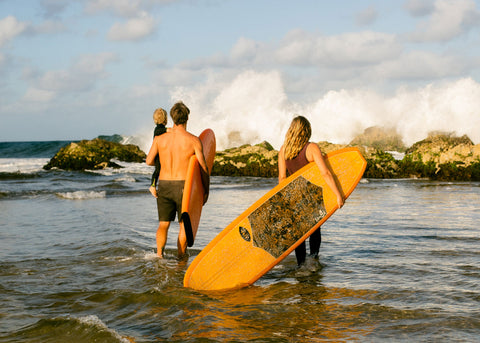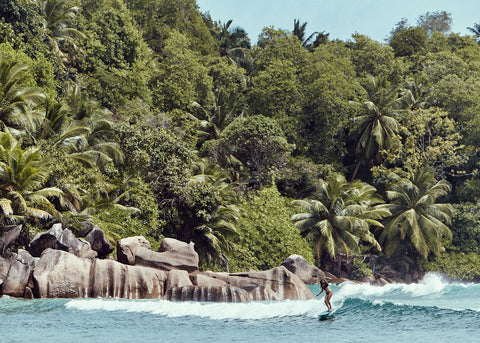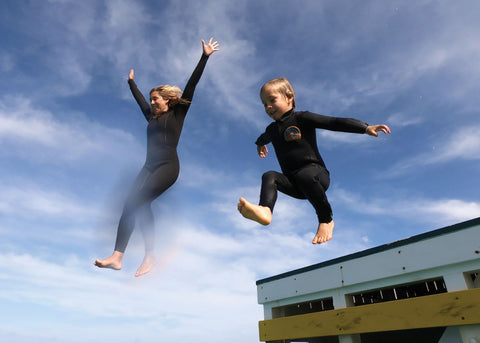Mums who Play: Interview with surfer Lauren Hill

This Mums Who Play Series is sponsored by The Natural Shoe Store, a store who stocks top quality, eco friendly brands that encourage everyday adventures (and lots of fun too).
Parents often don't prioritise their own version of playtime, but the benefits of being playful are both mental and physical. Professional surfer Lauren Hill, talks about talking time out from parenting and work to play in the ocean.
Tell us about yourself.
I'm a professional surfer and writer, and a mum to a five-year-old boy, Minoa.
I'm originally from an island off the coast of Florida called Anastasia, and I live on the east coast of Australia now. I call the Northern Rivers region of New South Wales home, and I've lived here for about 13 years.
How did you get started surfing?
When I was about 13, I had this really vivid dream about riding a wave, standing up, and having wind flying through my hair. It felt so easy and right that when I woke up, I was like: "Okay, this is what I need to do."
And so, I recruited a friend from school to take me out on his longboard and push me into some waves. I was pretty much hooked from there.
What did play look like before you started surfing?
It was always beach-centred because we were on an island. There was freshwater on one side and salty water on the other. So I played in tide pools, pretended to be a mermaid, and made dribble castles on the beach. There was also a river where you could collect oysters and catch fish.
Did you parents make time to play as adults?
Not really.
When my dad was a kid, his family moved around a lot because they were a military family. One of his moves took him to the north shore of Oahu, near a beautiful surf spot. So, he grew up surfing there and eventually made it to Florida and surfed there too. But he stopped surfing as an adult. In fact, I would say that both of my parents stopped playing when I was quite young.
My parents split up when I was one, and they had huge responsibilities on the table. They were working so hard to make ends meet that even as a child, I noticed something was missing from their lives. And looking back now, I see that besides rest, they were missing out on play—the space and time to play.
They both worked in the garden. My dad liked to grow vegetables, and my mum would take care of her yard. So they spent time in that borderline work/play zone, which I feel like many adults get stuck in.
What does play look like for you now, as an adult and a mum? Is it very different to when you were a kid?
Work-life and parenting dominate most of our waking hours, so there's a lack of time. And of course, logistics and literal thinking get in the way of that free association and creative space we dwell in as children. So, those two things are most different.
But having a five-year-old shows me how much wonder there is in the world. As parents, we try to respect that the world is full of newness and make as much time for free play as possible. We want to be in our bodies and creative selves and touch on that beautiful aspect of neoteny that our species holds onto. Neotony is the retention of childlike characteristics into adulthood. Dolphins have it, and dogs have it, and humans have it. It's an evolutionary adaptation that allows us to innovate and create in ways our logical, literal minds may not necessarily touch.

Do you parent differently from your parents?
I hope so. And the primary element there is having two single parents. They worked so hard to gift me an amazing life where I pretty much wanted for nothing. We weren't exceptionally well off, but I didn't need anything in particular. Except—and this is what I've realised as an adult—for their time. I was left without the time to laugh together and be in these open-ended spaces of play that I commit to being in with my son now.
So, when I look back and think, what would I change? I just wanted to sit and make eye contact, share stories, hear about their lives, and know more about who they are as people instead of just going through the motions of getting through the days. Which is kind of where they were as single parents, trying to get meals on the table and get off to work. There just wasn't a lot of time for just being together.
How do you make the time for that type of connection and play with your son?
Well, firstly, let's say that I don't always succeed, but I do my best. For example, I was away for three or four days last week and my partner was home caring for Minoa. Today was a school day, but I just felt a sense of disconnection from Minoa. So, we kept him home, and today we are at the beach, building sandcastles together, having those moments where we orbit around each other again, giving us that deep connection again. We don't need to be doing anything in particular, just making time to be together.
What does surfing mean to you?
Oh, gosh. So many things. One of the things I love about surfing is how it lets us grow into new versions of ourselves. Also, we evolve into new iterations of our surfing selves over time. Like, for the first 20 years of my surfing life, I loved riding longboards and going slow. It's a very subtle version of the surfing experience.
But after having Minoa, I wanted to go fast and take more risks in my surfing life. It inspired me to be more creative in a space where I was deeply familiar. And it was around the eight-week mark after having Minoa, when I got the okay to exercise; it felt powerful to reconnect with my body. It was powerful to feel grounded in my physical self away from this other person that had been—and still was in so many ways—attached to my physical body.
So, surfing is freedom and strength and space to be creative. And maybe the biggest part is that it provides a place to connect with wild nature and forces bigger than myself.

Do you think outdoor play helps you have a deeper relationship with nature?
Yes, and it's important because we belong in wild spaces. Every part of us grew and evolved in relationship with the living world. Our eyes and hearing didn't evolve to be inside four walls. And I see that with Minoa and almost all kids I know. Outside, they're lit up, alive, and exploring while using their senses. They're growing and learning through their play.
I think we've been led astray in our adult lives to isolate ourselves inside these indoor spaces. I know that being in the elements is still where I feel most connected and alive and where I feel like a sense of growth is present.
Why is play important to you?
Play keeps me creative, anchored in my body, and innovative.
I work with storytelling in various mediums through writing, podcasting and making films. And whenever I'm stuck and hit a creative block, I know it is time to go surfing. Because that sense of openness moves energy through our body metaphysically and physically, and often my best ideas, or the keystone moments in a project, will come when I'm just sitting when I've let go of forcing creativity, and I'm letting my mind rest on the white noise of the beach and the ocean while feeling the sun on my skin. So yeah, play does all of these things.
It also reminds me of a Henry David Thoreau quote I'm going to paraphrase and probably get wrong, but he said something like, "He who works long, doesn't work hard." He wrote a lot about productivity. He was writing about 150 years ago, but they're still so relevant, especially to conversations around play. I think we've set up the ratio of work in our lives wrong. We should be playing more. We should have more free time and work in intense bursts but much less. That's what feels good to me, anyway.
Does play make a difference in the way you parent?
Absolutely. Play in my life gives me time to put down my parenting hat and be in my strength and creativity. And with surfing, it's really about letting the terrestrial life go and being immersed in a changing scape of water, wine and sunlight and being captivated by that. And trying to play with this other energy—wave energy—is just fun.
Then, when I come back to parenting, I feel refreshed and like another part of myself has been stimulated and satisfied. I feel a connection to the person I was before motherhood largely defined me.
I recognise what an absolute privilege I have to do that, though. I'm not a single parent, I have a co-parent that I trust and feel safe to leave our son with, and I can give my maternal brain a rest for a while, mostly.
How do you play if the weather is bad?
Still in the ocean. It's not for everyone, but the ocean is my space of reflection, letting go, and getting thrown around a bit. As adults, we're so used to being competent and capable, or at least aspiring to be. But the ocean is a place where we will be humbled, thrown around and put in positions where we're uncomfortable. I feel like that's a really sweet space for stretching us and helping us to grow and bringing that growth back to parenting.

Aside from your partner, do you have other support systems or communities to help you play?
We live on a piece of land and have a big permaculture garden. It's a huge source of play for us as a family: growing food, picking food, getting to live with our hands in the soil and watching the magic of plants growing and fruits fruiting.
Part of creating that big garden project was to create space for other families to come and play with us. We have a couple of families nearby to us with children, so it's a great place for kids to run wild while the parents potter around and play.
It's the most cliché thing to say, but parenting was never meant to be done alone, and it feels more and more true. Modern parenting and isolation just make no sense for children or parents. So we lean heavily on friends who are close by to share the parenting load. On the flip side, the kids also benefit. We all share our own gifts, and the more adults that kids get to build trusting, loving relationships with, the more access they have to different ways of being and moving through the world.
Since surfing is your livelihood and your play, how do you make sure it remains playful, and you don't take it too seriously?
That's a really great question and it's definitely a balance.
Sometimes working as a surfer means shooting photos or filming with someone, which commodifies the experience. And then for play, we'll dedicate some time to hike into a remote beach and commit to spending half or a whole day in a purely wild space. And that helps delineate between work and play.
Do you have any advice for other parents about incorporating play into their lives?
I'm aware that many parents are overworked and under-resources and may feel like they don't have time to play. But I encourage them, even if you're feeling that way, to take 10 or 15 minutes for yourselves and pick up a paintbrush or build a sandcastle when their kids are playing at the beach, and just let their mind relax into this neotenous playful space because that energy is generative. It feeds us, and it's a gift back to ourselves.
And that's harder for mums. There's this cultural link between motherhood and martyrdom as if we're supposed to give ourselves away completely. But I can't be my best mothering self unless I have time to step away and nourish the part of me that still wants to be creating and growing and experiencing newness outside of the context of motherhood. And play is often my gateway to getting those things.
//
Lunch Lady Magazine partnered with The Natural Shoe Store for this interview with Lauren Hill as part of The Mums who PLAY series. For more interviews in this series check out our chats with Zulfiye Tufa here and Nici Ward here.
Top photograph by Cait Miers, second photograph by Nathan Oldfield.




